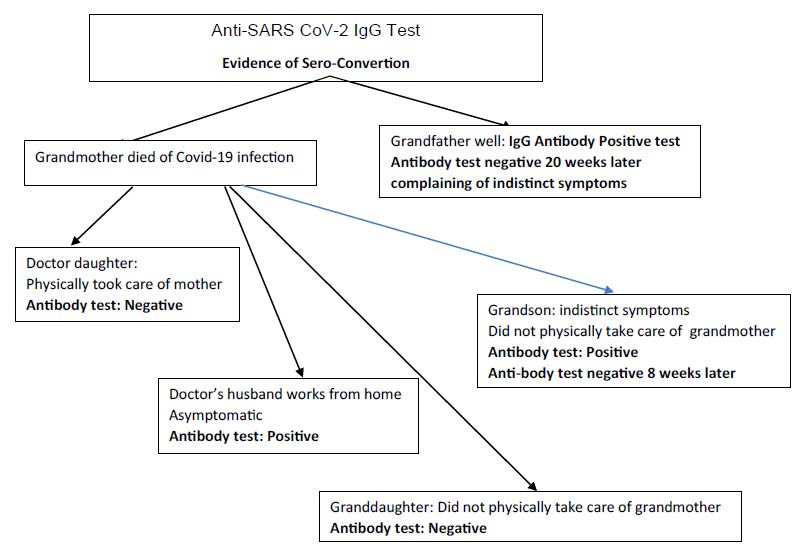DOI: 10.31038/SRR.2020314
Introduction
It is assumed that the presence of Anti-SARS CoV-2 IgG antibodies will show some contact with COVID-19 virus perhaps after a few weeks. However, it is not yet decided as for other viral infections like Measles, Mumps and Rubella whether the presence IgG has a lot of meaning, like the presence of immunity. We report on three cases which might shed some light on this. We were interested mainly on the relationship between positive IgG antibody SARS CoV-2 results and future SARS CoV-2 immunity. Would a positive Anti-SARS CoV-2 mean immunity for this new disease? The expectation is that if Anti-SARS CoV-2 IgG antibodies last forever after detection or vaccination, like Measles, Mumps or Rubella IgG, they will provide immunity.
Case 1
A 26 year old man developed indistinct symptoms of sore throat for 3 days after visiting his grandparents in March 2020. His grandmother died in March 2020 from COVID-19 infection. His grandfather was Anti-SARS CoV-2 IgG positive. This gentleman had two Measles, Mumps and Rubella vaccinations as a child. In April 2020, he tested positive for contact with SARS-CoV-2 IgG. However a repeat test 8 weeks later showed a negative IgG Anti-SARS CoV-2 IgG.
Case 2
A 50 year old woman had indistinct symptoms. She tested positive with Anti-SARS-CoV-2 IgG. A repeat test, 5 weeks later to assist her daughter take the test was again positive. A subsequent test after 13 weeks was negative for Anti-SARS CoV-2 IgG.
Case 3
An 82-year old man, grandfather of Case 1 developed indistinct symptoms of sore throat for 3 days. His wife died in March 2020 from COVID-19 infection when his Anti-SARS CoV-2 IgG was positive. A repeat test 20 weeks later showed that his Anti-SARS CoV-2 IgG was negative.
Literature Review
Unlike Measles, Mumps and Rubella, where a combination of clinical infection and vaccinations can provide life-long immunity, it has not been confirmed that clinical or Anti-SARS CoV-2 IgG provides life-long immunity. In fact, this is not considered to be likely from knowledge of SARS-CoV which expired itself after 1 year and MERS CoV which expired itself after 2 years. A positive test result shows you may have antibodies from an infection with the virus that causes COVID-19 illness, or possibly from infection with a related virus from the same family of viruses (called Coronavirus), such as one that causes the common cold.
We do not know yet if having antibodies to the virus that causes COVID-19 can protect someone from getting infected again or, if they do, how long this protection might last. You might test positive for antibodies even if you never had symptoms of COVID-19. This can happen if you had an infection without symptoms (also called an asymptomatic infection) (Figure 1).

Figure 1: Family tree of case 1.
Discussion
Our three cases demonstrate that Anti-SARS COV-2 IgG antibodies did not persist at 8 weeks, 13 weeks and 20 weeks respectively when the positivity of Anti-SARS COV-2 IgG antibodies was challenged for various reasons. This suggests that the immunity associated with IgG antibodies in other viral infections may not be immediately present even in the short term. This opens the door for repeated infections. This might also limit the value of a COVID-19 vaccine. It might direct us to more than one vaccination if SARS Cov-2 lasts longer than SARS CoV and MERS CoV.
The concept of sero-conversion is not new and might explain the events we have noticed with positive to negative results, with positive results reverting to negative results. What the potential of persistent infections and serious outcomes holds in future depends firstly on the behavior of the virus. If SARS CoV-2 dies out like SARS CoV and MERS CoV, then this problem will self-limit? If not, what other options do we have? One potential option is the COVID-19 vaccine. The third option is based on mass Measles, Mumps and Rubella (MMR) immunization. There is a logical rationale based on the similarity of COVID-19 proteins and Measles viruses [1,2] and similarly with Rubella virus [3]. Onwude and Sokunbi have submitted that Mass immunization with MMR vaccine is a potential option [Submitted to Lancet 10/9/2020].
References
- Sidiq KR, Sabir DK, Ali SM, Kodzius R (2020) Does Early Childhood Vaccination Protect Against COVID-19? Mol Biosci.
- Escriou N, Callendret B, Lorin V, Combredet C, Marianneau C, et al. (2014) Protection from SARS coronavirus conferred by live Measles vaccine expressing the spike glycoprotein. Virology 452-453. [crossref]
- Young A, Neumann B, Mendez RF, Reyahi A, Joannides A, et al. (2020) Homologous protein domains in SARS-CoV-2 and Measles, Mumps and Rubella viruses: preliminary evidence that MMR vaccine might provide protection against COVID-19.